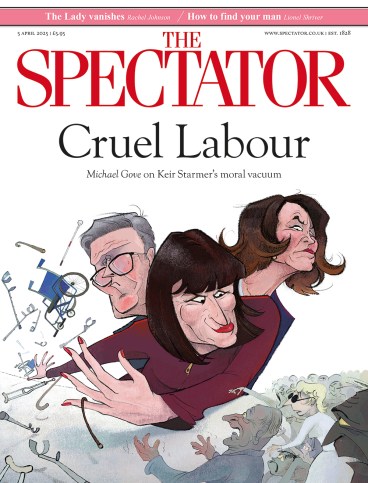
Open arms
Sir: The latest magazine (29 March) has two references to American military capabilities, from Rod Liddle and Francis Pike. Mr Liddle suggests that the prevalent attitude over there is that we ‘Yerpeans’ should have contributed more to the recent strike on Yemen (‘America first, Europe last’). He may not have known it was RAF tankers which enabled the US fast jets to attack. (This also escaped the Signal group chat.)
Mr Pike suggests that the US navy’s carriers are suddenly vulnerable to modern weapons (‘Carriers of bad news’). As an excellent historian, he will concede that commentators have been writing off naval carriers’ effectiveness for decades. He is right to say that the Americans will have to evolve new technologies to defend their ships. Fortunately, the US Department of Defence is the most successful developer of aerospace and military technologies in the world by far; it shall remain so. US forces will surely prevail in any arms race, whatever apparent advantages pop up from time to time, normally via their enemies’ propaganda. And I’m hopeful the UK’s Ministry of Defence will always be their first call for real support. In my experience, US leaders (military or otherwise) do not think all Europeans are bastards.
Justin Tooth
London W3
Black hole
Sir: As Rod Liddle suggests, we really ought not to be surprised at America’s impatience about us ‘not pulling our weight’ on defence. When President Lyndon B. Johnson pressed Harold Wilson to support the US in Vietnam, to his credit Wilson resisted. Dean Rusk as secretary of state is claimed to have said: ‘All we needed was one regiment. The Black Watch would have done – but you wouldn’t. Well, don’t expect us to save you again. They can invade Sussex and we wouldn’t do a damn thing about it.’ The irony is that now we don’t even have the Black Watch as a separate regiment.
Peter Mackay
Kincraig, Highland
Fat of the land
Sir: I urge Angus Colwell to come to Haworth, which is dripping heaven (‘Notes on…’, 22 March). The Golden Hind chip shop on Sun Street, surely the smallest, best and most memorable British chippy, uses nothing but this luscious swirling liquid; its products, juicy fish, terrific chips and scones (if you wonder, come and try them, they’re beyond marvellous) are uniformly five-star stuff. A few yards away, Geoff the butcher will sell you a pot of the most glorious beef dripping, half-white, half-brown. He does wonderful pig’s head potted meats too. Haworth is wonderful anyway, but dripping makes it quite complete. Better still, dripping is not good for you.
David Pearson
Haworth, West Yorkshire
Coining names
Sir: Mark Mason’s ‘Notes on coins’ (29 March) reminded me of a fascinating coin repurposed by my grandmother on her kitchen scales. It was a 1797 ‘Cartwheel’ penny, so nicknamed because of its huge size, weight (an ounce: a pennyworth of copper) and distinctive raised rim. Designed against counterfeiting and made at Matthew Boulton’s private mint in Birmingham from 480 tons of copper, ‘Cartwheels’ heralded the Industrial Revolution, being the first British coinage struck using steam power. Noteworthy as Britain’s largest and heaviest pennies, they are special too in colonial history: they became the first official currency of Australia when 132,000 were shipped there in 1800 to stabilise its chaotic, largely barter economy.
Peter Saunders
Salisbury, Wiltshire
Bully for you
Sir: In reference to Paul Wood’s excellent article ‘Age of autocracy’ (29 March), autocrats love to be called ‘strongmen’. We should always call them what they are: ghastly bullies.
Ian Peter MacDonald
Spean Bridge, Lochaber
War machines
Sir: I agree with the conclusion of your leading article that the government must aim to ‘re-engineer our military-industrial sector’ (‘Defensive position’, 29 March). Nevertheless, I feel that it largely leaves uncredited the ongoing development of revolutionary technologies. The DragonFire laser will break the power of drone attacks, which the war in Ukraine has shown to be deleterious, while quantum navigation will provide the solution to persistent Russian interference of GPS signals in Europe. In contrast, the French government website cites as an ‘innovation’ its robot mule PROBOT, which is not visibly much more than a remotely operated shopping trolley.
Luke Markham
London SW10
Question of luck
Sir: Surely train drivers ‘lucked in’ rather than ‘out’ as in your leading article when their pay demands were acceded to by the Chancellor?
Steve Harris
Great Maplestead, Essex
All that glitters
Sir: I’m sure Charles Moore knows this, but the young lady he describes riding upsides into a fence on the last day of this hunting season was obviously a descendant of Lucy Glitters (Notes, 29 March). Thank heavens she and her kind are still out there.
George Bingham
Winterborne Stickland, Dorset







Comments